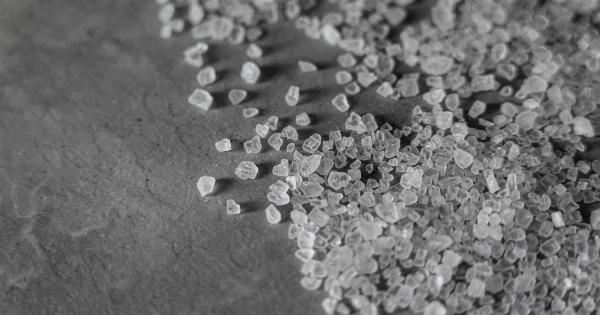Salt is a common ingredient in our daily diet, and while it may enhance the flavor of our meals, consuming too much salt can have detrimental effects on our health.
High sodium intake is directly associated with an increased risk of developing hypertension, heart disease, and stroke. Additionally, excessive salt consumption can lead to water retention, bloating, and kidney problems. Therefore, it is crucial to find ways to cut down on salt without compromising the taste of our favorite dishes.
1. Read food labels
One of the easiest ways to reduce salt intake is to become a mindful shopper. Start by carefully reading the nutritional information on packaged foods. Salt content is usually listed as sodium per serving.
Compare different brands to choose options with lower sodium levels. Aim for products that contain less than 140 mg of sodium per serving, especially for items you frequently consume.
2. Flavor with herbs and spices
Replace salt with herbs and spices to add flavor to your dishes. Experiment with various combinations of herbs like rosemary, thyme, basil, oregano, and spices such as cumin, paprika, turmeric, and cinnamon.
These natural flavor enhancers will not only reduce your salt intake but also bring a burst of delightful tastes to your meals.
3. Incorporate citrus fruits
Citrus fruits like lemons, limes, and oranges can be a fantastic addition to your meals. Squeeze some fresh lemon juice over salads, seafood, and grilled vegetables instead of reaching for the salt shaker.
The tangy and zesty flavors of citrus fruits will give your dishes a refreshing twist without the need for excess sodium.
4. Opt for fresh ingredients
Processed and packaged foods often contain high amounts of hidden salt. By choosing fresh, whole ingredients, you can have better control over your salt intake.
Cook meals from scratch and use natural ingredients like fresh vegetables, fruits, lean meats, and whole grains. Not only will this improve the overall nutritional value of your meals, but it will also help you reduce your salt consumption significantly.
5. Rinse canned foods
Canned foods, such as beans and vegetables, usually come packed in a salty brine to enhance their shelf life. To lower their sodium content, simply drain and rinse them under cold water before using.
This process can remove a considerable amount of excess salt, allowing you to enjoy these convenient pantry staples while keeping your sodium intake in check.
6. Make your own sauces and dressings
Store-bought sauces and dressings often contain excessive amounts of salt. Take control of your sodium levels by making your own homemade versions.
Combine fresh herbs, olive oil, vinegar, and various spices to create delicious dressings for salads or marinades for meats. Likewise, prepare your own flavorful sauces using ingredients like tomatoes, onions, garlic, and spices to complement your favorite dishes without adding unnecessary salt.
7. Gradually reduce salt
Gradually reducing your salt intake allows your taste buds to adjust over time. Start by using slightly less salt than usual in your recipes and taste the food as you cook.
You may find that you become more sensitive to the taste of salt as your palate adjusts. Over time, you can further decrease the amount of salt used until you no longer feel the need to add it to your meals.
8. Choose low-sodium alternatives
Many food products now offer low-sodium or no-salt-added alternatives. Look for these options when shopping for ingredients like canned soups, broths, and snacks.
By opting for low-sodium versions, you can still enjoy your favorite foods while reducing your overall salt intake.
9. Be cautious of condiments
Condiments such as ketchup, soy sauce, and salad dressings can contribute a significant amount of salt to your diet. Pay attention to the sodium content of these products and choose low-sodium alternatives or use them sparingly.
You can also explore homemade versions of these condiments using natural ingredients and less salt.
10. Hydrate adequately
Drinking enough water is vital for maintaining overall health and can help flush out excess salt from your body. Staying hydrated also helps prevent water retention and reduces the risk of bloating.
Make it a habit to drink at least eight glasses of water per day and more if you engage in intense physical activity or live in a hot climate.
The importance of reducing sodium intake
Cutting down on salt is crucial for maintaining good health.
By implementing these easy methods to reduce salt intake without compromising on taste, you can enjoy flavorful meals while taking care of your cardiovascular health, kidneys, and overall well-being.






























